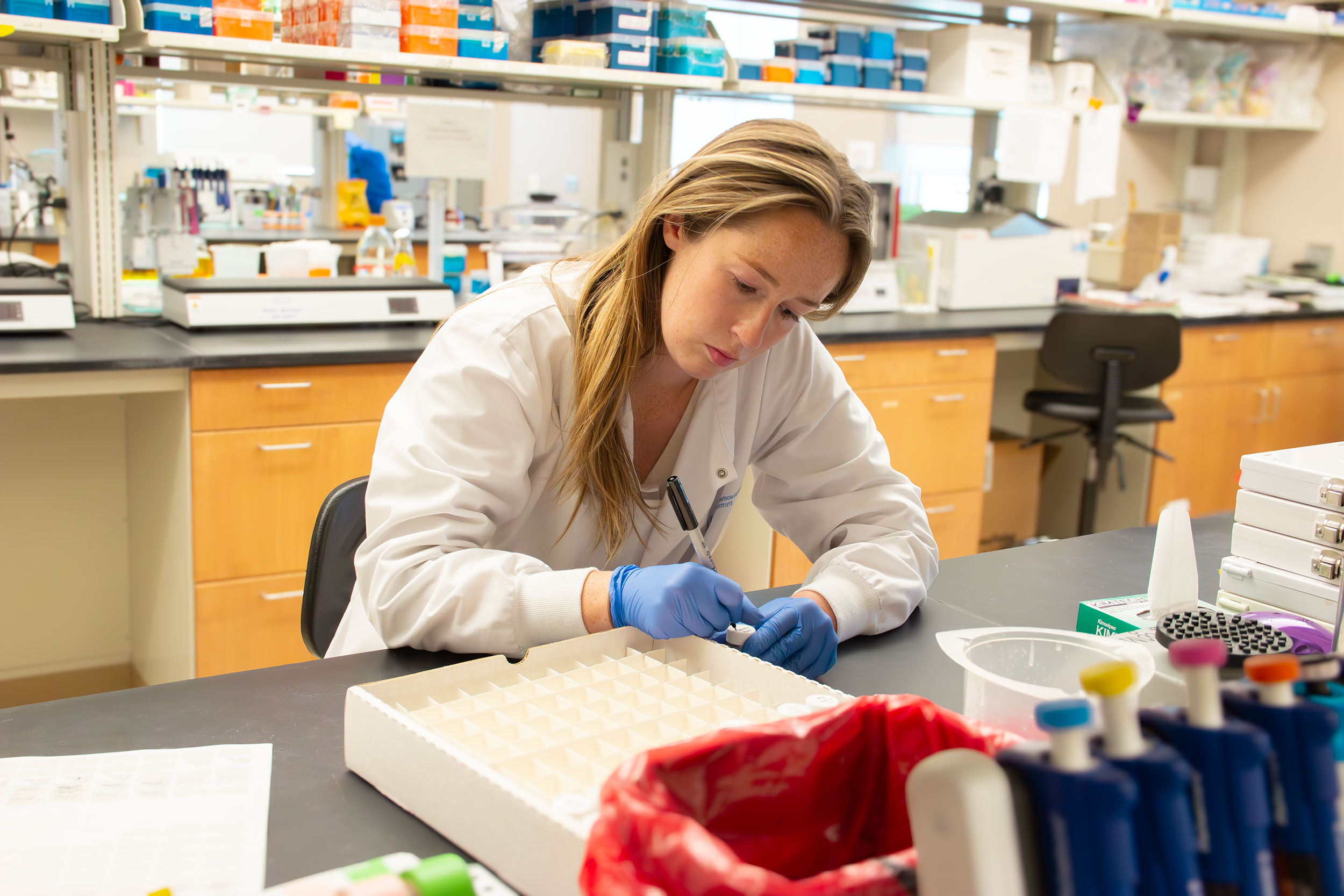Choline Under Pressure: Meeting the Needs of the Developing Fetus

Sandra Mooney, PhD, is an Associate Professor of Nutrition at the University of North Carolina at Chapel Hill’s Nutrition Research Institute. Her research explores how genes and environment affect brain development, focusing on prenatal alcohol exposure and nutrition-based interventions.
Hannah Petry joined the NRI in Fall 2022 and began her doctoral studies. Petry obtained her Bachelor of Science in Nutritional Sciences and Dietetics in May 2022 from Texas Tech University. Petry’s work in the Mooney Lab focuses on researching fetal alcohol spectrum disorder (FASD).
The overall theme of Mooney’s research is to understand normal brain development, how exposure to alcohol (and other drugs or experiences) disrupts this, what the behavioral outcomes are, and whether simple nutrition-based interventions can improve outcomes.
The Challenge
Prenatal alcohol exposure (PAE) can impair fetal growth and brain development—a condition often resulting in Fetal Alcohol Spectrum Disorders (FASD), which affect cognitive and behavioral functions. Although prenatal choline supplements have been shown to reduce these alcohol-related deficits, scientists don’t fully understand how alcohol alters choline metabolism or whether it increases the body’s need for choline.
The Discovery
Choline is a vital nutrient used for making cell‑building lipids and for donating methyl groups (chemical tags important for DNA, proteins, and other molecules). Maintaining a proper balance between these pathways is critical for growth and development. In a mouse model mimicking human PAE, the researchers found that alcohol redirects choline toward making more lipids, reducing its availability for methyl donation. This shift weakens methyl‑dependent pathways, causing cellular stress and altering normal fetal development. Importantly, adding extra choline partly restored these methylation‑related molecules, though lipid levels remained high, indicating the supplementation helped rebalance choline use.
Why It Matters
This research sheds light on why prenatal alcohol exposure (PAE) worsens developmental outcomes and how nutrition can play a role in reducing the damage. The key finding is that alcohol changes the body’s “choline budget”—diverting it toward making fats (lipids) needed for cell membranes, but leaving too little for methylation, a process essential for turning genes on and off and for healthy brain development. Even if a pregnant woman consumes what is normally considered enough choline, alcohol’s diversion effect can create a hidden shortfall.
For at-risk pregnancies, whether due to known alcohol exposure or low baseline choline intake, this means nutritional needs may be higher than current guidelines suggest. The results make a strong case for targeted choline supplementation during pregnancy, especially in combination with other nutrients that support methylation, such as folate and vitamin B12. For public health, this could influence dietary recommendations, prenatal supplement formulations, and counseling for women of childbearing age. The study adds to a growing body of evidence that precise nutrient strategies (precision nutrition) can help offset specific metabolic stresses and improve long-term developmental outcomes for children.
💡 Insight from the Researcher
Sandra Mooney, PhD, lead investigator of this study emphasizes: “These results give us a clearer picture of how alcohol affects a baby’s nutrition before birth and, more importantly, how we might help. By understanding that alcohol changes how choline is used, we can focus on making sure mothers get enough of this essential nutrient to support their baby’s brain and body development. It’s a step toward giving more children the healthiest possible start in life.”
Alcohol exposure may increase prenatal choline needs through redirection of choline into lipid synthesis rather than methyl donation. Petry HG, Saini N, Smith SM and Mooney SM (2025). Metabolites 15: 289. https://www.mdpi.com/2218-1989/15/5/289
